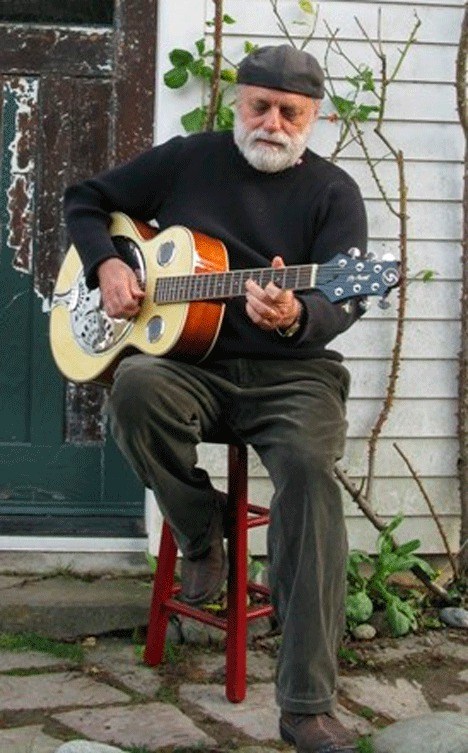Singin’ the blues doesn’t seem like a complicated endeavor.
The music is mostly a series of chord progressions dressed with blue notes that lower the pitch for some intense emotive expression and then are backed up by a story that makes you nod your head and smile when you should be crying.
But beyond its deceptively simple formula, the blues is the music that courses through the veins of America’s history, and from that blues-soaked blood came some of the richest jewels of American culture.
Local musician David Gregor wants to keep the story of the blues alive with “An Evening with Deja Blooze, Chronicling the Blues,” at 7:30 p.m. Saturday, Jan. 16 at Whidbey Island Center for the Arts.
Gregor, of Deja Blooze, will play with guest artists and fellow islanders David Licastro, Levi Burkle, Larry Neubauer and Dave Gignac in this Local Artist Series event to tell the story of the blues and honor the memory of Dr. Martin Luther King Jr.
Considering that the holiday honors the achievements of King and his courageous work during the Civil Rights Movement, a look at blues history is a fitting celebration because it is more than a musical chronology.
The blues was born the day the first West African was sold into slavery in the United States and was no longer allowed to go home again.
The blues grew within the African American communities of the Deep South at the end of the 19th century, where one could hear slaves singing spirituals, work songs, field hollers, shouts and chants throughout the sun-soaked cotton fields.
Out of these songs of the plantations, enslaved Africans in America created their own canon of narrative ballads that helped an entire population of mistreated people survive their fate. These ballads would help a people who were ripped away from their homeland remain connected to the roots of their culture.
Leaving behind the pain of slavery, the blues eventually made its way from the plantations to the heart of the largest American cities and into the violent struggle for human rights.
Today the blues is rooted in every form of American popular music including jazz, rhythm-and-blues, rock ’n’ roll and rap.
And like the chord progressions the music is known for, Gregor and his band will show the progression of the blues with a two-hour musical journey through the history, styles, language and events that define it.
Gregor said his love of blues music and its significantly American way of storytelling is what made him want to form a band.
Deja Blooze emerged as a guitar and vocal duo in November 2007 and released its first CD, “Blues for Two,” in December 2008. A second CD of originals songs written and sung by Gregor entitled “Alone with the Blooze” will be available at the show. The music is a mix of original and traditional acoustic and electric blues with an emphasis on an up-tempo interpretation of Delta-inspired roots music.
Gregor said he is influenced by blues greats such as Robert Johnson, Son House, Charley Patton and John Lee Hooker.
“Also, I’m a child of the ’60s and was influenced by the British blues explosion with people like Eric Clapton and the Rolling Stones,” Gregor said.
Of Clapton he said, “I love that he can take an obscure blues tune and make it contemporary. I like that and I think, ‘How can I deja-fy that?’
“I don’t want to copy, but I want to do what people like Hooker did with his simple delivery — his one-chord challenge. How can I do that?”
There’s a format for creating a blues song, just as there is for a sonnet, he said.
“There’s a blues pattern that includes a chord progression, a tone, language and the telling of the tale. That’s what I love to do. I’ve tried to stay within that point of reference and stay true to the original tone of the blues.”
In his song, “Gone Up Country,” Gregor found a way to create a classic blues song while honoring King:
Well, I’ve gone up country — got myself back home
I left in a hurry — and I left all alone
I lost my good life — not the best to be had
I wanted what was good — what
I found was sad
I had me a dream — of love that was old
It wasn’t enough — or so I was told
Don’t look for me marching — my marching days are gone
I’ve gone up country — my time is done.
You’re looking for a light — all bright and true
I’m gone, but you’ll see — that light is you.
With Licastro on guitar, Neubauer on keyboards, Burkle on bass guitar and Gignac on harmonica, Gregor said that he feels especially blessed to be joined onstage by such talented players.
“These guys are all great musicians,” Gregor said. “It’s fun to watch the unfolding while we rehearse. They aren’t afraid to change it up, try new things. I get to watch their musical minds at work which is a treat for me. They’re just the best guys.”
Gregor referred to bluesman John Cephas’ line, “Blues music isn’t sad — it’s the cure for being sad.”
That’s the context in which “Chronicling the Blues” will be presented, he said, with its chords, tone, stories, painful history and all its mystery intact.
The concert is recommended for ages 16 and older.
Tickets are $12.50 for adults, $7.50 for youths and are available at WICA by calling 221-8268 or at www.WICAonline.com.


